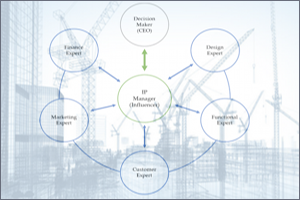New research project at MIPLM: Agile IP-Design in the construction industry
The World Economic Forum in 2015 has warned that humankind is standing on the brink of a new industrial revolution that will change the way we live, work and relate to one another. This revolution is characterized by a fusion of new technologies that are merging the physical and cyber worlds and have the power to disrupt entire systems of production, management and governance.
This points to corporate agility – the ability to receive and successfully act upon information by swiftly shifting resources – as a pivotal business strategy for surviving and thriving in the 21st century. In the older days, teamwork was defined by the textbook definition as the fact that there’s more than one person, different personality types and working styles, and the actions and nuances that take place in the course of working together. But this kind of definition doesn’t work in agile environments.
In this work it is shown that IP can only be thought of from an organizational point of view, otherwise the IP design of valuable exclusivity rights is difficult to impossible. The biggest challenge might be the cultural challenge, especially the personal willingness to change from “me first” to “we first” or “customers first”. In this project, many important cultural factors (but not all) were addressed and a possible team composition with role allocation is mentioned, that would allow agile working with IP aspects in mind. In addition, the meaningful use and emergence of IP-Design is shown on the basis of successful but also less successful practical examples in the market. A seven-step program with iterative and flexible (agile) process steps is proposed and a practical application example with the emergence of IP in the agile design process is demonstrated.
For the future of IP, it will be important to what extent people can develop mentally and emotionally and to what extent old organizations and structures can be changed. The market has already become more flexible and exciting than 15 years ago, as many start-ups offer new solutions for customers’ needs that have not been discovered earlier, but many start-ups also fail. The core for successful IP-Design is therefore the starting point for customer needs. These customer needs should have remained undiscovered until now. The success of IP design and, in a broader sense, of products on the market, stands and falls with the ability to discover or sense new customer needs. The decisive factors here are freedom of thought, high emotional intelligence, exercise and inspiration from unique people in the environment.
 This research project was conducted by MIPLM graduate Denis-Robin Cvetkovic and supervised by Prof. Dr. Alexander Wurzer and Dr. Thibaud Lelong at CEIPI.
This research project was conducted by MIPLM graduate Denis-Robin Cvetkovic and supervised by Prof. Dr. Alexander Wurzer and Dr. Thibaud Lelong at CEIPI.
Denis-Robin Cvetkovic is Intellectual Property Manager at Umdasch Group Ventures GmbH. In 2019 he graduated with a master’s degree in the Master of Intellectual Property Law and Management MIPLM at CEIPI, Université de Strasbourg, France.
Here is a description of the research project: Practical use of a lean version of IP design in an agile environment in the construction industry.



